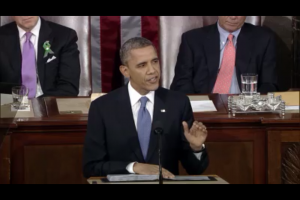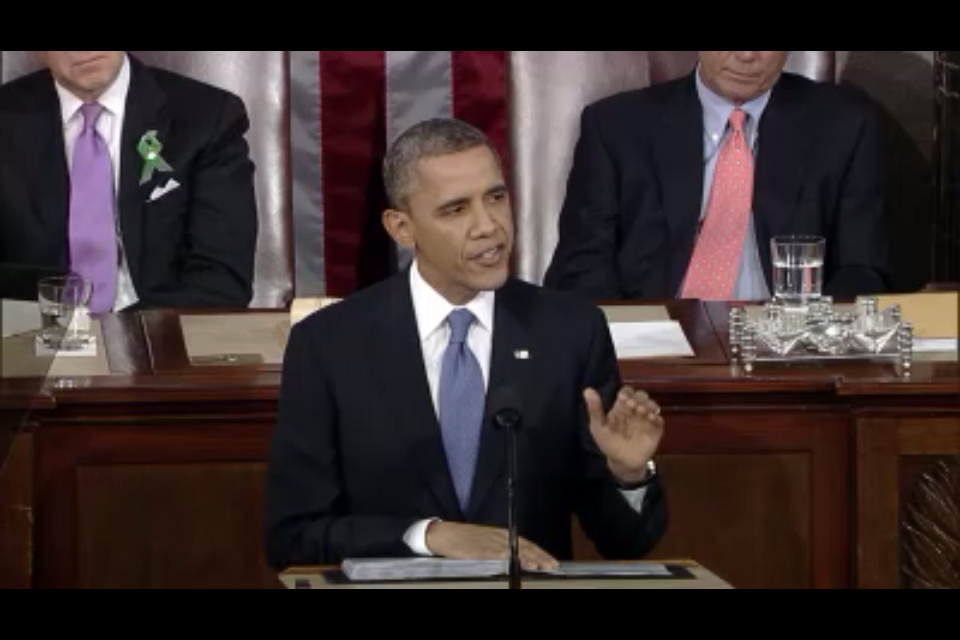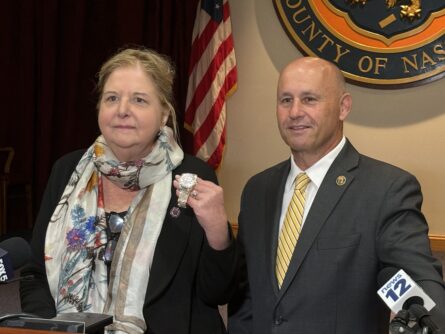
President Barack Obama laid out more than a dozen new initiatives Tuesday in the first State of the Union address of his second term, packing an array of issues into the hour-long speech, including four—climate change, immigration, veterans and gun control—of particular importantance to Long Islanders, a few of whom were in the audience.
Obama started off flat while discussing his budget and tax reform proposals, but he worked his way up to an emotional plea for Congress to enact new restrictions on firearms sales to reduce the number of gun deaths nationwide. He sounded encouraged by current immigration reform talks among lawmakers, but the president oscilated between urging the Republican leaders in the House of Representatives to negotiate a compromise on the upcoming deficit reduction plan known as sequestration, and threatening to use executive orders if Congress doesn’t act on global warming.
“We can choose to believe that Superstorm Sandy, and the most severe drought in decades, and the worst wildfires some states have ever seen, were all just a freak coincidence,” Obama said, referring in part to the Oct. 29 hurricane-nor’easter hybrid that ravaged LI and the Northeast. “Or we can choose to believe in the overwhelming judgment of science—and act before it’s too late.”
The president remained vague on most of his proposals, choosing to paint a broad picture of the goals he’s setting for the year to come, but did get into some specifics while discussing immigration and, to a lesser degree, gun control.
“Senators of both parties are working together on tough new laws to prevent anyone from buying guns for resale to criminals,” the president said, before rallying for a vote on the bill. “Police chiefs are asking our help to get weapons of war and massive ammunition magazines off our streets, because these police chiefs, they’re tired of seeing their guys and gals being outgunned.”
Among those top cops was John Aresta, the Malverne village police chief, whose uncle was among six murdered in the 1993 Long Island Rail Road massacre. He was invited to attend by Rep. Carolyn McCarthy (D-Mineola), whose husband was killed and son injured in the same shooting spree that launched her to the national stage to advocate for gun control.
“I personally don’t see a reason why anybody would need a 30-round clip or a 10-round clip for an assault rifle,” Aresta had told Fox Business News last month shortly after New York State passed sweeping new gun control laws in the wake of the Newtown elementary school massacre in December.
Rep. Peter King (R-Seaford), the lone Republican among LI’s five-member Congressional delegation, wrote on Twitter that he was disapointed in Obama’s lack of focus on unemployment and deficit reduction, but co-authored an op-ed in Politico expressing support for ensuring background checks for all gun purchases, with the exception of gifts between family members or temporary transfers for hunters. He noted national estimates that only four in 10 gun buyers are subject to such checks.
New York City got two mentions. Obama first touted the heroic nurses who evacuated newborn babies from the NYU Langone Medical Center in Manhattan during Sandy, signaling Menchu Sanchez by name. She was seated next to First Lady Michelle Obama. He later extolled the benefits of P-Tech in Brooklyn, a collaboration between New York Public Schools, the City University of New York and IBM, where students graduate with a high school diploma and an associate’s degree in computers or engineering—a model he wants emulated nationwide.
The emphasis on improving education to better the economy dovetailed with his reasons for supporting immigration, a hotly debated issue on LI, where undocumented Hispanic immigrant day laborers have repeatedly been victims of Suffolk County hate crimes in recent years.
“Our economy is stronger when we harness the talents and ingenuity of striving, hopeful immigrants,” Obama said, emphasizing that reform must include stronger border security, cutting waiting periods, attracting highly skilled engineers and “establishing a responsible pathway to earned citizenship—a path that includes passing a background check, paying taxes and … learning English.”
But some immigration issues are easier to solve than others. Rep. Steve Israel (D-Dix Hills) invited as his guests Dania and Nick Marvos, a Little Neck couple who were in the process of adopting a 1-year-old boy named Ari from Russia until two months ago when Russian President Vladimir Putin signed a law banning American adoptions of Russian children. The move was widely seen as retaliation for a recently passed U.S. law punishing Russian human rights violators.
“Waiting for news to see if we will be allowed to bring our baby home has been one of the most trying times in our lives,” Dania Mavros said in a statement released by Israel’s office. “Devastating does not capture the emotional roller coaster that we are enduring every day.”
Congressman Israel said he is negotiating to help the couple complete the adoption process despite the new Russian law in an attempt to save their son-to-be from growing up in an orphanage. Thousands of other cases are also in jeopardy.
Rep. Tim Bishop (D-Southampton) invited Dina McKenna of Lindenhurst, whose husband, Sgt. William McKenna, died in 2010 of cancer caused by his exposure to toxic fumes from burn pits the military used for disposing of hazardous waste in Iraq. Bishop had laws passed to curtail the use of burn pits and require the Department of Veterans Affairs to improve its treatment of soldiers exposed to them.
“All veterans whose health may have been affected by toxic burn pits must be accounted for and given the health care and support they have earned,” Bishop said in a statement.
Obama’s nod to veterans came as he promised to better defend against cyber attacks, end the more than decade-long war in Afghanistan “by the end of next year,” prevent Iran from building nuclear weapons and isolate North Korea for its provocations in testing nuclear weapons potentially capable of being fitted on inter-continental ballistic missles. He reiterated plans to strengthen U.S. missle defense to block such an attack.
The commander-in-chief also made clear that while the military will not be sending large numbers of troops abroad for Iraq-style occupations, he vaguely referred to special operations forces that will continue to hunt al-Qaeda terrorists in Afghanistan and wherever else they may be hiding. He made veiled reference to the continued deployment of predator drones despite recently renewed controversy over their use to kill American citizens working with terrorists, such as Westbury-native Samir Khan, the al-Qaeda propagandist killed in U.S. airstrikes alongside militant cleric Anwar al-Awlaki in Yemen in 2011.
“Where necessary, through a range of capabilities, we will continue to take direct action against those terrorists who pose the gravest threat to Americans,” he said.


































